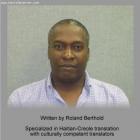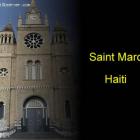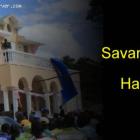ADVERTISEMENT
Education - Haiti Observer Blog
Education, Haiti Observer Blog. Read the following articles about Education
14 Per Cent of National Budget for Universal Education in Haiti
Education has remained a key obstacle for Haiti's economic and social development. A survey indicates that approximately 35% of the Haitian youth are unable to read and on average Haitian children spends less than four years in school. The present Martelly government is committed to offer free and universal education on a priority and has rolled out a plan get 1.5 million students in school with improved curriculum and trained teachers by 2016.
On February 7th, 2014, the Haitian President Michel Martelly told a special session of the OAS (Organization of American States) Permanent Council that his government has sanctioned 14% of the national budget to promote universal education. Universal education gives access and equal opportunity to all people to education regardless of their background, class, ethnicity or physical disabilities. According to the Haitian President, the government held view that education is the linchpin for every development process whether it is on protecting environment, judicial system or for economic development. His government is in the process of identifying prospective areas for promoting foreign investments.
Vandalism against lycee Daniel Fignole in Port-au-Prince
Phrases like, 'Education is the answer' and 'The children are the future' apparently mean little to the group or groups of people committing acts of vandalism against some of the nation's schools. Last year's instance took place on October 28, when tear gas bombs were flung at students in the midst of classes at the lycées Philippe Guerrier and Baptiste Dudy Boukman. Almost exactly three months later, another attack has taken place.
The school vandalized this time is Port-au-Prince's lycée Daniel Fignolé, the weapon of choice, feces. Students and staff at the school are understandably strongly upset. The students have been described as traumatized by the Ministry of National Education and Vocational Training (MENFP). The ministry condemned the act, calling it odious and stating that it shows the degradation of morality and social values.
Learning French the main goal of education in Haiti
Haiti is a country of 10 million, give or take. Of that number, more than 90% speak Creole. The constitution of 1987 mentioned Creole as the single most binding language among the Haitian people. Why then is it still marginalized, and why is French, spoken by only 10% of the population, still the dominant language in the professional Haitian world, to the detriment of the majority of the population? It is these issues that Jacques Pierre, a Creole Studies professor at Duke University, is asking in an open forum for his recent piece in the Miami Herald called 'Haiti's French/Creole Divide'.
Nursing education in Haiti increased from 3 years to 4 years
Almost exactly three years ago, one year after their necessary role in Haitian society was made glaringly clear to those in need of and lacking aid after the 2010 earthquake, the focus on the country's small fleet of nurses grew and the newfound interest allowed for the creation of a brand new program for nursing in the country. The need arose after the quake took the lives of near to a hundred nurses in the country and also brought down the Port-au-Prince school for nursing.
In 2011, the new plan to revive the field came in the shape of a master's degree program, requiring three years of study, was made available to nursing school students from five of the public schools for nursing across the country. Included in the three years of study, students followed decades' held curriculum studying mainly for hospital service. This left a gap in the market for other fields such as patient education, pediatric care, public health program management, surgery and primary care.
University of Limonade closed following altercation, sequestration and death
Haiti violence has reached the University of Limonade. On Monday, as a result of a demonstration by students of the University, Haiti National Police intervened and as a result, a shopkeeper was killed, several people were injured and many property destruction were recorded.
It was also reported that some of the University students were involved in the sequestration of the administrative and academic authorities of the University of King Henri Christophe campus in Lemonade.
Se pou kombyen tan Inivèsite sa aprale femin-la? Nou deja pa minm ginyin lekol an Ayiti.
Eske Elev sa yo ki te kimbe direkte sa yo te intelijan asse pou yo te konnin ke yon bagay kon sa gin gro danje ladan li? Eske yo konning yon ti non yo rele "kidnaping"
Worcester Parish to help Immaculate Conception Parish in Les Anglais
The prosperous Christ the King Parish (CKP) of Worcester has voted to subsidize Immaculate Conception Parish (ICP) in the poorer town of Les Anglais. Before the parish council met to vote on the matter, the church made an outreach to their parishioners with a letter informing them of the proposal being discussed. The majority of parishioners were decidedly enthusiastic about the twinning of the two parishes.
Les Anglais, a fertile farming community, is subject to hurricane activity, which repeatedly damages its infrastructure, and has been in need of support for some time. With a monthly donation of $600.00, ICP School will receive tuition, teachers' pay, textbooks, and a hot meal.
Digicel receives Award for Contribution to Education in Haiti
Telecommunications giant, Digicel, one of Haiti's mobile phone providers, won a Corporate Citizens of the Americas (CCA) award at a dinner in Washington D.C. The Trust for the Americas (The Trust), in partnership with the Organization of American States and the Inter-American Development Bank sponsors the CCA award. The honor was presented to Digicel CEO Sophia Stansky and Project Director, Rachel Pierre.
It was given to Digicel in the Vulnerable Communities division for its work in education. Digicel's foundation plans to construct 150 schools in the next year with 450-plus hours of teacher training, including mentoring and professional development, offered to 600 applicants.
Overpopulation in Haiti Holds Country Back from Recovery
Overpopulation on the globe has become a serious concern to governments. All sectors of society are affected: jobs, education, healthcare, and agriculture. In emerging nations, the phenomenon is more intensified. Weak economies cannot create sufficient employment opportunities to lift people out of poverty. Nowhere is this truer than in Haiti. On the index of failed states, the small island has difficulty gaining traction to provide employment, housing, education, and healthcare to 70% of its 10 million population.
The poor in Haiti have become so desperate they often take to the streets, setting cars on fire and erecting barricades to obstruct the flow of commerce to voice their indignation at what they are forced to endure. Much of the violence occurring in places like Port-au-Prince come from gang activity. The Haitian National Police try to manage it but between inadequate manpower and the underground nature of gang activity it is like treading water.
Haitian Studies Association welcomed over 250 scholars
After a quarter century, the contributions made to Haiti's academic patrimony by the Haitian Studies Association have been rightly celebrated by 9 past presidents, 250 current scholars and various organizers, activists, practitioners and researchers in the field at the annual conference held November 7th to 9th.
On the occasion, various panels were held covering topics such as history, literature and even Haitian vodou. Speeches were given, including one by Michele Pierre-Louis, former prime minister, and two sessions were held on the work of the late Michel-Rolph Trouillot who was a respected anthropologist.
Vivian Gautier, ninety-six years old, received an award for her contributions to the promotion of Haitian dance for over 70 years. Also awarded were filmmaker Arnold Antonin, playwright and author Franketienne and authors Georges Eddy Lucien and Kate Ramsey.
Coursera and State Department to Bring Online Courses to Poor
Coming out of an agreement made by the U.S. State Department and Coursera Inc. online courses will be offered to students in over 30 locations across the globe, free of charge and without the need of personal internet accounts. The new courses will include tutorials in mathematics, computer science, biology, and business science.
The company, Coursera, which offers free online courses through the internet, was founded in 2011 by Andrew Ng and Daphne Koller, two computer science professors from Stanford University. The aim of this new initiative is to provide ways to education for people, often from third world nations, who cannot afford traditional schooling, or even regular internet courses because they cannot afford the internet.
Our objective is to share with you news and information about Haiti and the people of Haiti. Traditions, habits and the way we were or grew are alive in this site. We highly recommend that you Subscribe to our Newsletter and also share with us some of the things that are memorable and made us unique people.

 Haitian Creole Translation
Haitian Creole Translation  Saint Marc, Haiti
Saint Marc, Haiti  Life After Death
Life After Death  The Town of Savanette, Haiti
The Town of Savanette, Haiti  Black Friday Shopping Season
Black Friday Shopping Season